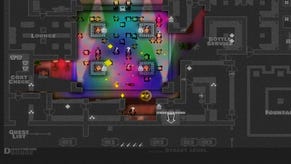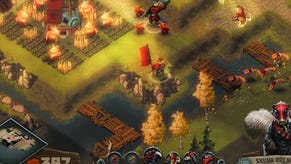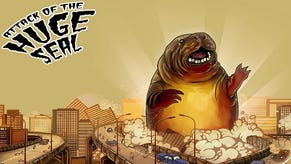Monaco Developer Announces "First Great Gamepad RTS"
Who Pockets The Pocketwatchmen?
Monaco developer Pocketwatch have announced a new game, which they are currently calling "Armada". This is, they stress, currently a working title, and the game is in the very earliest phases of development, having no real art to its name. But there is a strong concept, and they're keen to talk about that.
I caught up with pocketwatch man, Andy Schatz, to talk about the new game, which he described as "an RTS you could play in a party setting." Have a nose at that below.
Andy Schatz has been working the indie angle for many years, but he is now best known for his IGF-winning Monaco, which was supported by Indie Fund, and won the coveted award with what turned out to be quite an early version of the co-op heist game. With over 750,000 units now shipped Schatz says he has "no complaints" over the game that took him three years to complete.
You join us as we discuss the pitfalls of developing games, which are so often such complex problems that they could be worked on forever. "We were six months from finishing the game for about two years, I think," says Schatz of his time on Monaco. "Because you're always at about six months to go and then you think 'I could add this one thing, and then...' That's another month of work."
I suggest that games are often more abandoned than finished, thanks to that endless potential for adding and finessing. "I love the analogy of sandcastles for games," says Schatz. "It seems so appropriate to say that sometimes the tide comes in and you just have to work on something new. But, regardless of that, the most important thing you can do is finish games. This isn't about just making games, it's about finishing them."
Having supported Monaco for almost a year with ongoing updates (largely with the help of Schatz' partner at Pocketwatch, Andy Nguyen) it seems that they are now finished, and it's time for that next thing. "I spent much of last summer prototyping games, and the first one I did was similar to Armada in a lot of ways. It's a game design I have been holding onto for years and years, and the first time I built some iteration of this was back in college with my room mate. It was called Dino Drop and was a split-screen strategy game with autonomous units. The idea of a real-time strategy game with autonomous units has always been something I have wanted to make. We only ever got into the very basics of the prototype of that game, but it stayed, and that's also the inspiration of the Venture games that I built: dropping characters into a world, and using your knowledge of their behaviour to develop a strategy."
Schatz says this led to the new Pocketwatch project, which they are codenaming Armada, or more typographically, [ARMADA]. "I'm not even ready to get into the narrative or setting of the world yet, which is an odd way to approach it," he says.
What interests Schatz enough to talk publicly at this stage, though, is the systems that are common to RTS games. He immediately cites classic Starcraft and C&C as influences, but also diagnoses problems with the RTS as it is currently understood. "These days I don't want to sit at my desk to play RTS games with strangers. Even though I am a PC gamer, I want something more comfortable."
"One of the shells I'd like to crack here is to be able to play this game at a deep level, but also make it approachable for people who aren't familiar with or immediately comfortable with PC RTS games."
Does that mean slowing down the pace from the frienzied heights of PC RTS clickathons? "No!" exclaims Schatz, "but micro and APM are such dominant forces in real-time strategy games that if you play against someone who has a higher APM they're generally going to beat you. You can win through smarts, but nevertheless that's one of the things that make RTS games less approachable."
This is something Pocketwatch have obviously been breaking down, as is clear from Schatz' examples of how other games work: "It's interesting to put Warcraft 2 and the original C&C next to each other. In Warcraft it's much more zoomed in, and characters will have abilities that require a click, but in C&C it's further out, slower, and everything is controlled with a single click. RTS now means constant clicking, zooming about the map, and that endless micro. The earlier RTS games definitely felt slower, but they were less focused on that micro. We want to make that micro management fun. The problem is that as a physical task it's not that interesting to learn. Oppose that with learning to play Geometry Wars, where there's a thin connection between you and what's happening on screen, and you can see the difference. In an RTS like Starcraft the translation of ideas in your brain to actually executing things on screen is much longer."
What this means for Armada is a design that gets rid of unit orders, and makes things playable on a game pad. "A game pad is analogue," Schatz observes, "and as a consequence it is centered around a single point in space. That means the gamepad is built for controlling characters, but less good for micro-managing units in an RTS. So what we've done is create a character, in a similar way to a MOBA, but the strategies and behaviours of the game world are definitely those you would be familiar with from an RTS: you are building factories that pump out units, and you are taking advantage of their particular intelligence in your strategy."
The MOBA mention should not worry those who are uncomfortable in the world of lane games, it seems: "We've gone some of the way towards how a MOBA does things, but then we came back towards the RTS again."
Schatz goes on to explain a little more about this autonomous unit concept: "Some sorts of fighting unit are going to go off and just find and fight the enemy," he says, "Or another might follow the player, and another might defend the general area unless the player collects that unit for an attack. You might have units that are behaviourally defenders, and gather resources, but attack if enemies get close. Selection of how units will act happens at build time, therefore, rather than on a moment to moment basis. Customising the buildings you create will change the behaviour units associated with that factory, and so on. So all the RTS stuff is right there."
The plan is for the playable version of Armada to start with a PvP matchmaking game, but Schatz envisions it supporting co-op, and that leading to a PvE situation. "I don't want to promise game features we haven't implemented, so to some extent we'll just have to use our imagination. With Monaco we always felt like we were six months from done, but this time we'll embrace that... but once we have a PvE campaign there's not a huge leap to turn that into single player."
The reason to announce now, Schatz explains, is because he wants to do this in public, and get people involved as quickly as possible.
"What we're building, at its heart, is a multiplayer real-time strategy game, and that revolves around community. One of the things I found with Monaco was that just developing in the open from the beginning is fun. Every single time you have an idea you can test it in public."
"We'll have it on Early Access as soon we have a build that is playable," says Schatz.
That might be a while off, of course, and there are no dates set. As you can see, the assets are fairly sparse, with Schatz quickly drawing us a logo on some lined paper. He says of the current build: "It is not pretty! I expect we're going to leave it that way for a good long time." But art, aesthetic and character design, he notes, represent their own problems and opportunities, and this was a lesson they learned from Monaco. "We definitely discovered there is a huge power in roleplay. Not even conscious roleplay, necessarily. People just liked certain characters, and would play as the character they saw themselves as. That was a huge entry point, and was an important thing that we did right."
"Another point," he says, "was that we sold a lot of copies and we did that with a game that is pretty weird-looking. We're nowhere in Armada from an art perspective, and we probably will go with a more approachable art style this time, but I think the lesson from Monaco was that you don't have to make a game that is for everyone, you just have make someone's favourite game. And if it's someone's favourite game, it should appeal to a lot of people. We want to make someone's favourite real-time strategy game, of all time. If we can do that, we'll have succeeded."
"And hey, we're not Minecraft, but someone just messaged us with a Monaco-themed wedding cake. That's pretty cool. That means we'll approach Armada in the same way."
You can keep up with the plans for Armada over on the Pocketwatch site.










